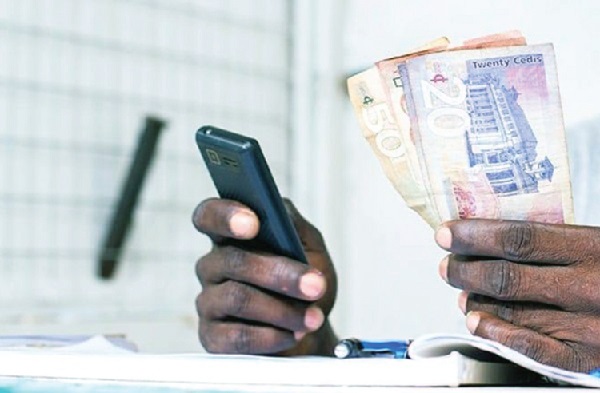
Cashless evolution: Mobile money’s impact on businesses in Ghana
MOBILE money has revolutionised Ghana's business landscape, becoming an essential tool for entrepreneurs and small businesses.
With platforms such as MTN Mobile Money, Telecel Cash, AT Money and Zeepay, business owners can manage transactions, access credit and reach customers more effectively.
Mobile money is a payment type based on accounts held by a mobile operator and accessible from subscribers’ mobile phones.
According to Statista, a statistics platform, as of January 2024, 59.7 per cent of Ghanaians aged 15 and older had a mobile money account, reflecting a stable adoption rate. In 2023, Ghana had approximately 20.9 million active mobile money accounts, indicating a steady increase in usage (Federal Reserve Economic Data).
Furthermore, the Ghana mobile money market, valued at $161.3 billion in 2023, is projected to grow to $789.5 billion by 2032, highlighting the rapid expansion of mobile money services (Research and Markets).
These statistics demonstrate mobile money’s pivotal role in enhancing financial inclusion and supporting economic growth in Ghana.
Cornerstone
A fintech analyst, Jeremiah Akanyi, believes mobile money has become a cornerstone of financial inclusion:
“Before mobile money, many entrepreneurs were left out of the financial system. Today, they have the tools to thrive, from sending payments to accessing credit.”
“Mobile money has transformed the way small businesses and entrepreneurs operate in Ghana, offering them tools to overcome financial barriers, access credit, and streamline operations,” he said.
Mr Akanyi also highlighted how mobile money platforms are leveraging transaction histories to facilitate access to microloans.
"The data generated from mobile money transactions is invaluable for assessing credit risk. It allows lenders to offer tailored loans to small businesses," he said.
Additionally, he said mobile money has also democratised financial access for artisans, traders and service providers, reducing dependency on cash and mitigating the risks of theft and fraud.
Challenges
Despite its benefits, Mr Akanyi notes challenges such as high transaction fees and network downtimes. He urges stakeholders to improve infrastructure and affordability to sustain mobile money’s growth:
"The industry must focus on affordability, security and reliability to improve user trust and encourage further adoption."
Expanding on Innovation
Mobile money platforms are evolving with features such as AI-powered credit scoring, which helps businesses access tailored loans. Cross-border payments and QR code systems are also simplifying transactions, enabling small businesses to grow and engage in global trade.
Partnerships
That notwithstanding, the success of mobile money relies on partnerships between mobile network operators (MNOs), banks and fintechs. These collaborations create tailored products such as microloans for entrepreneurs, while improving payment security and trust in the ecosystem.
Simplicity
Ama Kusi, who owns a clothing boutique in Kumasi, shares her personal experiences with mobile money. She credits the platform for simplifying her business operations:"My customers prefer to pay with mobile money because it’s faster and safer than carrying cash. I also use it to pay my suppliers and utility bills without travelling to the bank."
Ms Kusi also appreciates the access to credit mobile money has provided: "I took a mobile money loan to expand my shop. It was quick and didn’t require complicated paperwork like the banks.”
However, she points out some challenges, such as occasional network downtimes and high interest rates on loans.
"The loans are helpful, but the interest rates can be overwhelming. I hope they find ways to make it more affordable. This innovation is not just a financial tool but a lifeline for many. With continued investment and collaboration, mobile money will remain a cornerstone of Ghana’s entrepreneurial success, driving financial inclusion and economic transformation,” Ms Kusi stated.
Convenience
Kwame Aboagye, who runs a small logistics company in Accra, echoes Ama’s sentiments about the convenience of mobile money.
"Mobile money has simplified how we do business. I can pay my drivers instantly, even when I’m out of the office. It’s incredibly efficient."
Mr Aboagye emphasises how mobile money has helped him maintain smooth operations:
"It saves me time and resources, especially when managing multiple drivers. I don’t have to worry about cash logistics anymore."
Reliability, security
However, Mr Aboagye has reservations about the system’s reliability.
"There are times when the network is down, and I can’t process payments. It’s frustrating, especially during peak hours."
For customers such as Efua Mensah, a trader in Takoradi, mobile money offers unparalleled convenience and security.
"I no longer worry about carrying cash when I go shopping. With mobile money, I can pay instantly, and it’s so secure," she says.
Ms Mensah finds mobile money particularly useful when purchasing goods from distant vendors:
"I can buy items from Accra and pay with mobile money without travelling. It has made my life so much easier."
Confidence
Kojo Antwi, another mobile money user, shares a similar sentiment.
"I trust mobile money because it’s reliable. Even when I buy items online, I can pay safely without meeting the seller in person."
Mr Antwi highlights how mobile money has increased his confidence in transacting with businesses:
"It’s reassuring to know I can pay without carrying cash or worrying about counterfeit money. Mobile money is the way forward."